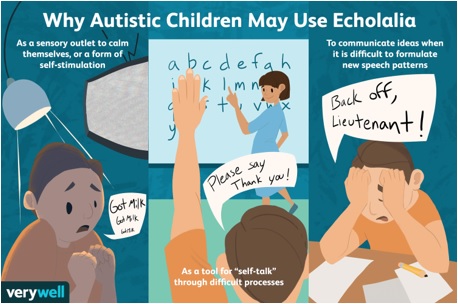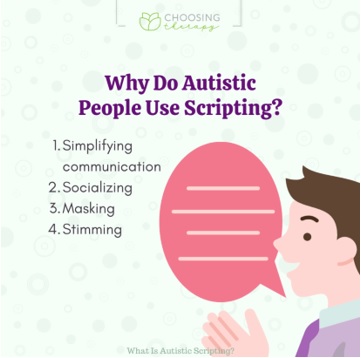Why Autistic Children Echo Sounds And Words: A Guide To Echolalia And Autistic Scripting
16th June 2023
Echolalia and autistic scripting are two linguistic phenomena commonly observed in individuals with autism spectrum disorder (ASD). These communication patterns involve repetition and mimicry of words, phrases, or scripts, serving different functions and providing valuable insights into the autistic mind. In this essay, we will explore the nature of echolalia and autistic scripting, their significance in the context of autism, and the potential benefits they offer in enhancing communication and understanding.
What Is Echolalia?
Echolalia refers to the immediate or delayed repetition of words, phrases, or even entire conversations that individuals with autism hear from others. It can be a symptom of dementia, aphasia, schizophrenia, and traumatic brain injury. However, it is most commonly associated with Autism Spectrum disorder.

Source: www.verywellhealth.com
It is often found to be annoying by some. But, it is an age-appropriate behavior for beginning talkers. Since autistic children are not always non-verbal, many of the words that they use are often complex adult words. One of the major challenges of understanding echolalia in autistic children is that repeated patterns can be used for various reasons. It can be self-stimulation, prefabrication, or self-talk.
Functions Of Echolalia
One of the primary functions of echolalia is communication. Many individuals with autism struggle with expressive language skills, making it difficult for them to initiate and maintain conversations. Echolalia allows them to participate in social exchanges by using familiar phrases or sentences that they have heard before.
By echoing words or phrases, individuals with autism can convey their thoughts, needs, or desires, even if they are unable to formulate original responses. It provides them with a tool to engage in social interactions and express themselves, bridging the communication gap they may experience.
Furthermore, echolalia plays a crucial role in language acquisition and development. It serves as a form of "auditory scaffolding," allowing individuals with autism to practice and internalize language patterns, sentence structures, and vocabulary.
Through repeated exposure to words and phrases, they can grasp linguistic structures and meaning, gradually building their own language skills. Echolalia acts as a stepping stone toward independent and spontaneous language production, enabling individuals with autism to develop their expressive abilities over time.
Types Of Echolalia
The different types of echolalia include:
- Immediate and delayed echolalia describes the timing of the repetitive words
- Functional or interactive echolalia is directed toward communication with others
- Mitigated echolalia is where children repeat some words but with changes
- Non-interactive echolalia occurs for reasons other than communication
While echolalia can be a beneficial communication tool, it is important to note that not all instances of echolalia are functional or purposeful. Sometimes, echolalia may emerge as a self-soothing or self-regulatory behavior, providing comfort and familiarity to individuals with autism. In such cases, echolalia may not necessarily serve a communicative purpose but rather act as a coping mechanism to regulate sensory or emotional experiences. Understanding the underlying reasons and functions of echolalia is crucial in supporting individuals with autism effectively.
What Is Scripting?
Autistic scripting, on the other hand, involves the repetition of self-generated phrases, sentences, or dialogues that individuals with autism create. It can often be a form of echolalia, but not always.

Source: www.choosingtherapy.com
Unlike echolalia, which involves the repetition of external stimuli, autistic scripting is a form of self-generated language. Autistic scripts often reflect the individual's intense interests, obsessions, or passions. These scripts can be derived from movies, books, video games, or personal experiences and are repeated with consistency and precision.
Functions Of Scripting
Autistic scripting serves several functions for individuals with autism. It offers a means of self-expression and self-regulation, allowing them to engage with their interests and passions. It provides a sense of predictability and structure, creating a comforting and familiar environment in which they can navigate social situations or manage sensory stimuli. Autistic scripts can act as a cognitive aid, helping individuals with autism organize their thoughts and communicate their ideas effectively.
Moreover, scripting can facilitate social interactions. By utilizing familiar scripts, individuals with autism can initiate and maintain conversations, as well as participate in social play. Scripts can serve as a shared language between individuals with autism and their peers, enhancing their ability to engage and interact with others who may share similar interests or knowledge about specific topics.
Can You Stop Echolalia And Scripting?
This is a question that often crosses parents' and teachers' minds. The simple answer to this is a YES! But how do you do this?
For starters, if you are trying to approach echolalia and autistic scripting strictly from a behavioral point of view and direct it toward reward and punishment, you are likely to fail. Not only this, but you will also damage the relationship with the child and might also destroy their psyche.
Thus, it is highly essential for you to understand the function of echolalia and autistic scripting and base your methods accordingly. For example, if the behavior is socially ostracizing and is having a negative impact on the child, then you must focus on improving the skill set as per the appropriate behavior desired.
To fade these behaviors you must understand the function behind it and then help a child achieve the lacking skill sets.
What Can You Do Better?
While echolalia and autistic scripting is a common behavior in autistic people, they can still have many functions. For many children, they act as a step towards learning how to communicate while developing their language skills. If you are not sure about how to make sense of your child's use of echolalia and autistic scripting, consider pursuing a Live Online International Teaching Diploma Course to understand the functions and support your children better as they learn to communicate.
Find the right course for you and try out the course. Contact us at 1800 - 212 - 6400. You can also mail us at act@asiancollegeofteachers.com.
Written By : Sanjana
Leave a Reply

